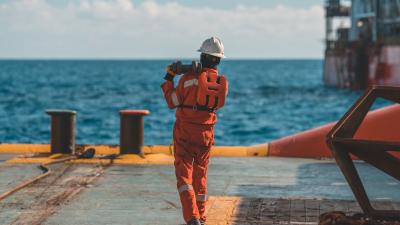
Improving access to redress for workers vulnerable to violence and harassment in South Asia
Experts discuss the factors that make some workers more vulnerable than others to violence and harassment.
This page is approximately a 4 minute read
This page was published on

Alishba Zaman, Project Coordinator, Maritime Just Transition Task Force (MJTTF)
On Monday, 10 February, the 11th session of IMO’s Sub-Committee on Human Element, Training and Watchkeeping (HTW) commenced discussions on the safety of seafarers handling alternative fuels on ships.
During the event, a joint submission was made by the International Chamber of Shipping and International Transport Workers’ Federation on behalf of the Maritime Just Transition Task Force, bringing to light the safety challenges faced by seafarers aboard vessels powered by alternative fuels, and advocating for the approval of interim training guidelines.
The implications of this submission could be far reaching. By sharing this research with decision makers at one of shipping’s primary regulatory forum, The Taskforce along with its partners are helping progress the development of mandatory instruments that will help ensure safer outcomes for seafarers around the world as the maritime industry decarbonises.
Zero and near zero GHG emission fuels such as ammonia, methanol and hydrogen present unique challenges and hazards to the crew’s health and safety, requiring specialised knowledge and safety measures to be adequately and effectively implemented.
Currently, there is no global baseline framework for training for ammonia, methanol and hydrogen as well as many other alternative fuels and new technologies. This lack of shared understanding means that shipping organisations may not recognise training undertaken by seafarers while employed with another company. The potential impact of this on employability and mobility of seafarers cannot be understated.
Whilst this is a major challenge, the transition to alternative fuels also presents the shipping industry with the opportunity to lead the way, ensuring there are robust regulatory instruments that prioritise a safety-first approach and increase collaboration and knowledge sharing across the maritime sector.
The purpose of the Maritime Just Transition Taskforce is to ensure that shipping’s response to the climate emergency puts seafarers at the heart of the solution.
The Taskforce helps deliver on IMO’s 2023 greenhouse gas reduction strategy, which aims to achieve net-zero emissions by or around 2050, while promoting a just and equitable transition. Our work seeks to strengthen and coordinate collaboration between industry, workers, governments, and academia towards a safe, equitable and human-centred approach to the transition towards a decarbonised shipping industry.
Consideration of Training Aspects for Seafarers on ships powered by ammonia methanol and hydrogen, a report published by the Taskforce in November last year in collaboration with Lloyd’s Register’s (LR) Maritime Decarbonisation Hub and the United Nations Global Compact (UNGC) Ocean Stewardship Coalition, made over 500 considerations generated from cross-sector consultations and risk assessment workshops with leading industry experts – and provided the basis for our submission at HTW11.
Key outcomes from the sub-committee included:
So, what does this all mean? Primarily, it means that the Taskforce’s mission to make sure that the shipping industry’s response to the climate emergency puts seafarers at the heart of the solution is working.
The Taskforce now has a global platform to ensure decarbonisation is delivered in a way that is safe, sustainable, fair and equitable. The submission at HTW11 was the culmination of years of hard work, cooperating with a range of different global stakeholders to ensure the safety of seafarers is a recognised as an absolute priority by decision makers moving forward.
The outcome of HTW 11 and the impact of our submission demonstrates that safety is an area of collaboration and not competition.
We are so grateful for our partners, supporters and industry professionals from across the value chain who have participated in technical workshops and contributed expertise, and to all NGOs and others who have acted as a sounding board throughout this process. We are all working together because we share a common goal: to accelerate the adoption of zero- and near-zero GHG emission fuels in a safe and responsible manner.
The Taskforce will continue collaborating with partners to deliver a training framework for seafarers, which once published will be freely available for seafarers around the world.
